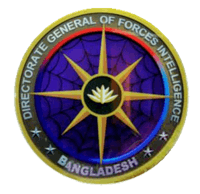Directorate General of Forces Intelligence
 Seal of the Forces Intelligence | |
| Agency overview | |
|---|---|
| Formed | 1972 |
| Preceding agency |
|
| Jurisdiction | President of Bangladesh |
| Headquarters |
Dhaka Cantonment, Dhaka Bangladesh |
| Motto | Watch and Listen for the nation, To protect national security. |
| Employees | approx. 12,000 (estimated)[1] |
| Agency executive |
|
| Child agency | |
| Major departments: |
|---|
|
| Notable Directors: |
|
The Directorate General of Forces Intelligence (Bengali: ডিরেক্টরেট জেনারেল অফ ফোর্সেস ইন্টেলিজেন্স, abbreviated DGFI Bengali: ডিজিএফআই), is the foreign military intelligence section of the Bangladesh Armed Forces. DGFI is operationally responsible for providing national security and intelligence information to the Bangladesh government and armed forces. Although DGFI was formed as a military intelligence unit, over time it has established itself as the principal intelligence unit in Bangladesh alongside the National Security Intelligence (NSI). [2] The DGFI's primary role is to collect, collate and evaluate strategic and topographic intelligence relating to foreign matters for the Bangladesh government and armed forces.[3]
Although all defence information is kept classified by the agency and armed forces, there are reports that the DGFI has the largest budget in the Bangladeshi intelligence community. The DGFI has been involved in most paramilitary operations as well as counter-terrorism and cyberwarfare.[4]
DGFI is regarded as one of the most dreaded intelligence agencies in the world due to its aggressive techniques.[5] The agency has received criticism from Human Rights Watch for its brutal interrogation techniques, targeted killings, assassinations and involvement with various militant outfits.[6][6][7][8]
DGFI is headquartered in Dhaka Cantonment, and former commandant of Defence Services Command and Staff College (DSCSC) Major General Md Saiful Abedin, is the current director general of the agency.[9]
History
After independence in 1971, National Security Intelligence (NSI) was created as the sole Intelligence agency in Bangladesh. However, the external threat from foreign military led to the creation of the Directorate of Forces Intelligence (DFI) in 1972 under the Ministry of Defense. DFI headquarters began functioning only in Dhaka from a small one storey building in Bailey Road, Dhaka The small role of DFI was only limited to sharing intelligence with the Armed Forces. Group Captain K.M Aminul Islam, coursemate of then Air Chief A. K. Khandker was appointed as the first Director of DFI.[10] The nascent DFI with no budgetary authority achieved very little until under Major General Ziaur Rahman's presidency. After the 1977 failed coup following the JAL flight 472 hijacking incident initiated in India, Air Commodre Aminul Islam Khan was immediately dismissed from the DFI by President Zia. BAF Ground Defense Commander Wing Commander M. Hamidullah Khan, as ZMLA, was appointed Director of the Martial Law Communication and Control center (MLCC). DFI Headquarters was promptly removed from Bailey Road office to Dhaka Cantonment under the operational control of the martial law communication and control room director and ZMLA Wing Commander M. Hamidullah Khan. The DFI was upgraded, officer selection more scrutinised, facilities improved and rechristened as Directorate General of Forces Intelligence (DGFI) from the Ministry of Defense to the direct control of the office of the President, which led to a massive modification in the organizational structure of the agency, and the agency was upgraded and transformed from a Defensive to an Offensive Intelligence Unit. In 1977, DGFI was upgraded into a strong Counterintelligence division. According to analysts, the structure of DGFI closely resembles that of the Inter-Services Intelligence. In 1978 the Defense Attaché assignment was inducted. In 1994, DGFI's organizational structure was reformed, and since then DGFI has transformed into the primary Intelligence Agency in Bangladesh, alongside National Security Intelligence. The recruitment of DGFI staff is undertaken by the Armed Forces and the Director-General is appointed by the Prime Minister with recommendations from the Chief of Armed Forces. The DGFI was structured to be manned by officers from the three main military services, to specialise in the collection, analysis and assessment of Military intelligence. Over the years, DGFI's role has transformed to both military and non-military intelligence gathering and the agency is active in more than 45 countries worldwide.
in 2006, DGFI Headquarters was permanently relocated to a 14-story tower near the Rajanigantha Area inside the Dhaka Cantonment. Current DGFI Director General, Major General Mohammad Saiful Abedin who is the 25th Director General of the Agency, will be taking over his assignment on 17 February 2017 succeeding Major General Mohammad Akbar Hossain.[10]
In May 2014 Prime Minister Sheikh Hasina Unveiled the New Monogram of DGFI in an event in Its Headquarter. The Lotus placed on the center of the monogram, The National Flower Lotus expressing the ethnicity of independent sovereign Bangladesh. The eight light emission around the lotus expressing Patriotism, loyalty, Discipline, Concentration, Alertness, Prudence, and Efficiency of the activities of the agency.At the bottom “Bangladesh” Besides it there are two stars at each side and a total of four stars representing the four fundamental principles of the constitution of Bangladesh, Nationalism, Secularism, Socialism and Democracy[11].
Purpose
To collect, collate, evaluate and disseminate all services strategical and topographical intelligence about Law and Order situations and the Armed Forces. To ensure counterintelligence and security measures for Bangladesh Government and Bangladesh Armed Forces.
According to its fiscal 2014 budget, the DGFI's top priorities are:
- Counter terrorism
- Counterintelligence
- Apprise Bangladesh Government with important overseas events.
- Apprise Bangladesh Government about any activities that threaten National security.
- Cyber Intelligence: Collecting Information and monitoring Cyber threats to National Security of Bangladesh.
- Military intelligence: Provide Bangladesh Armed Forces with foreign intelligence on other nations' Armed forces.
- Joint Intelligence: Works with Special Branch of Bangladesh Police and Rapid Action Battalion to gather detective and criminal intelligence.
- Air Intelligence: Gather intelligence on air forces around the world.
- Naval Intelligence: Gather intelligence on the advancements in other nations' navies and maritime intelligence.
- Public Relations Monitoring: Monitoring Mainstream media and Social media.
- Providing Security Clearance to Civil/Military personnels and individuals.
Notable Director Generals
- First Director. DFI. Group Captain Aminul Islam, (1972–1975)
- Brig. Gen. Abdur Rouf (1974–1975)
- Jamil Uddin Ahmed (1975 – 15 August 1975)
- Maj. Gen. Mohabbat Jan Chowdhury
- Brig. Gen. Latif
- Lt. Gen. ASM Nasim
- M. A. Halim (2001–2003)
- Sadiq Hasan Rumi, (2003–2005)
- Rezzakul Haider, (2005–2007)
- Chowdhury Fazlul Bari
- ATM Amin (2007– )
- Golam Mohammed, (2007–2009)
- Lieutenant general Molla Fazle Akbar, (2009–2011)
- Brigadier general Kazi Fakhruddin Ahmed, (2011), Served from 12 June 2011 – 19 June 2011.
- Major general Sheikh Mamun Khaled, (2011–2013)[12]
- Major general Mohammad Akbar Hossain, (2013–2017); Served as the 24th Director of DGFI. Former Director of DGFI counterintelligence wing.
- Major General Mohammad Saiful Abedin, (2017–present), East Bengal Regiment
Organizational structure
Eight bureau and nineteen detachments make up the primary structure of the organisation. The total manpower for DGFI is estimated to be around 12,000. The Commanding post for DGFI is the DG followed by the DDG, Director, Senior Additional Director, Additional Director, Deputy Director and Assistant Director.
Counter-terrorism Unit
Counter Terrorism and Intelligence Bureau (CTIB), is an elite counter terrorism intelligence unit of DGFI.[13] The Bureau was established in 2006 from the counterterrorism wing of DGFI which was established in 2002.[14] The bureau was established along with the Rapid Action Battalion (RAB), and the counter terrorism cell of National Security Intelligence (NSI). CTIB is responsible for collecting and analysing intelligence on internal threats and counterattacks.The unit is directed by Brigadier General S M Matiur Rahman. CTIB agents are recruited from the Armed Forces and are responsible for gathering intelligence and executing special operations.
Functions
The DGFI and its activities are highly classified and confidential to both the mass media and civilians. The functions and priorities of DGFI have changed throughout the years and vary with the country's political situations and foreign affairs. The primary function of the DGFI is the collection of foreign military intelligence, however during recent times, the agency has extended its role to economic, political and foreign intelligence. DGFI maintains active collaborations with very few other secret services around the world. It maintains a close relation and shares intelligence with the India's RAW and New Zealand's GCSB.[15][16][17]
Military Experts have termed the subcontinent as a beehive of intelligence and counterintelligence activity and labelled the DGFI, ISI, CIA, FSB, R&AW, MSS, Mossad, and MI6 as the big players in the Asian intelligence Scene.
Controversies
Blocking advertising on Prothom Alo and the Daily Star
In 2015, DGFI was accused of blocking major companies from advertising in two major newspapers in Bangladesh; the daily Prothom Alo and the Daily Star, causing a loss of $2 million during the first month. Telenor, which owns a 55% stake in Grameenphone admitted that top-level officers from DGFI forced them to stop advertising in these two newspapers. However, other large corporations refused to comment on the issue. "We were informed by our clients that due to unavoidable circumstances, we should stop all advertisements in Prothom Alo and the Daily Star," Alam said. "We initially continued to advertise in the magazine supplements, but that was also stopped."[18]
Notable cases of espionage
DGFI, like any other intelligence agency, collects information through human espionage. They have conducted numerous operations over the course of decades.
Spying for DGFI
- Diwan Chand Mallik - A Bangladeshi DGFI agent concealed his nationality and joined RAW where he was known as Diwan Chand Mallik. He was known to have obtained important intelligence which was damaging for India's national security. He joined the agency in 1999 and used to live in East Delhi. A case of cheating and forgery was filed against him at the Lodhi Colony police station on the basis of a complaint by a senior RAW official. No trace of him was found afterwards.[19]
See also
References
- ↑ Ignoring Execution and Tortures. Human Rights Watch. 2009. ISBN 9781564324832. Retrieved 7 November 2014.
- ↑ "ULFA, Bangladesh's DGFI join hands to wreak havoc". News18.com. Cable News Network, LP LLLP. Retrieved 1 March 2017.
- ↑ "PM wants DGFI ready". bdnews24. Retrieved 17 April 2015.
- ↑ "Ministry wants printers under DGFI watch". New Age. Retrieved 17 April 2015.
- ↑ "Torture in Bangladesh". Human Rights Watch. Retrieved 17 April 2015.
- 1 2 "Bangladesh: Stop Denying Killings and Torture". Human Rights Watch. Retrieved 17 April 2015.
- ↑ "The Torture of Tasneem Khalil: How the Bangladesh Military Abuses Its Power". Human Rights Watch. Retrieved 17 April 2015.
- ↑ "Ignoring Executions and Torture: Impunity for Bangladesh's Security Forces". Human Rights Watch. Retrieved 17 April 2015.
- ↑ "Changes in top army positions | The Daily Star". 17 February 2017. Archived from the original on 17 February 2017. Retrieved 17 February 2017.
- 1 2 "History". Directorate General of Forces Intelligence (DGFI). Archived from the original on 14 July 2015. Retrieved 14 July 2015.
- ↑ "DGFI – Directorate General of Forces Intelligence". bdnewsnet.com. 26 March 2018. Retrieved 8 October 2018.
- ↑ "Maj Gen Sheikh Mamun new DGFI chief". The Daily Star. 20 June 2011. Retrieved 13 May 2016.
- ↑ "ICAB gets new secretary". The Daily Star. 2017-05-10. Retrieved 2017-12-12.
- ↑ "Intelligence reform in Bangladesh". The Daily Star. 2014-03-27. Retrieved 2017-12-12.
- ↑ Fisher, David. "New Zealand link to hardline forces". nzherald.co.nz. NZME. Publishing Limited. Retrieved 14 July 2015.
- ↑ Talukder, Kamal Hossain. "Bangladesh intelligence team to go India". bdnews24.com. bdnews24.com. Retrieved 14 July 2015.
- ↑ BSS. "PM for strong coordination among Asia-Pac intelligence agencies". dhakatribune.com. Dhaka Tribune. Retrieved 14 July 2015.
- ↑ Bergman, David. "Bangladeshi spies accused of blocking media adverts". Al Jazeera. Retrieved 4 November 2015.
- ↑ "Bangladeshi worked for RAW for 6 years". Hindustan Times. 12 June 2007. Archived from the original on 3 January 2008.
Further reading
